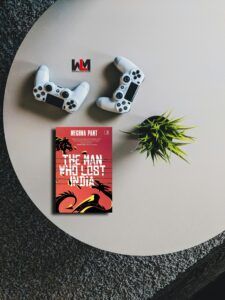Hi, this is Mili here, again and today, we have the pleasure of chatting with Meghna Pant, an extraordinary talent in the world of writing, screenwriting, journalism, and public speaking. With a remarkable list of accolades to her name, including prestigious awards like the Bharat Nirman Award and the Commonwealth Short Story Prize, Meghna is a true trailblazer in her field. She has captivated audiences worldwide with her bestselling books, such as ‘BOYS DON’T CRY’ and ‘HOW TO GET PUBLISHED IN INDIA.’ Join us as we delve into the fascinating journey and insights of this multifaceted achiever.

Mili: How did you get the idea to write about geopolitical issues? What’s even more exciting is that you added elements of sociology, the supernatural, and romance between two people who are economically apart, along with a spicy, sarcastic narrative. How did you manage to blend all these elements together? Was there a Eureka moment when this story came to you?
Meghna: Climate change anxiety is real for anyone who has read a newspaper or a tweet. And this anxiety led me to write The Man Who Lost India, which examines how climate change leads to 21st century’s biggest war—between India and China.
It is inevitable that due to water scarcity, water wars will become commonplace, especially in Asia. As inter-riparian relations collapse, China will try to assume the role of Asia’s water hegemon. Let’s not forget that China’s foreign policy this century will be driven by economic needs due to resource stress. This will be detrimental to the interests of its downstream neighbours and therefore become a flashpoint for other Asian riparians, especially India with its 400 rivers.
Climate change is inevitable. War is inevitable. The annihilation of both nations is inevitable. What the book foregrounds is what we can do about it, and thus find hope and resolution in the catastrophe.
This book is an amalgamation of the visceral (thought), cerebral (intellectual), semantic, experiential, and temporal. Since a book like this has never been done before, with the story tying into the past, present and future, research for the book took me three years. Therefore, there was not one eureka moment but many as I wanted to capture not just the brutality of war but also its humanity.
Mili: Can you elaborate on how you developed the patriarch character? You know who I mean. That character is really complex and has layers. How did you balance the different layers of his character?
Meghna: Readers will care about your novel only when they care about your characters. They will not read your novel because they want the world to be saved. They will read your novel because they want your protagonist to save the world. That’s why I conduct Character Interview’s for all characters before writing them down. Everything from the etymology of Seth’s name to his narrative arc were developed, layered and complicated, as is each and every human being on this planet
Mili: How did you maintain balance in your story? It’s a mashup of four distinct topics that are very different from each other, and simultaneously stretching them is quite a hectic job. How did you manage to do that?
Meghna: By working for twenty years on my craft!
Mili: What inspired the title “The Man Who Lost India”?
Meghna: It is based on one of the protagonists Manu who is willing to lose everything, including his country, because he has lost the love of his life. It shows us that the greatest wars we wage stem from matters of the heart, and therefore while “The Man Who Lost India” is a war novel, it is also a love novel. It also gives us a narrative convenance of who can save India.
Mili: What themes or messages do you hope readers will take away from this book?
Meghna: The book is an amorphous child now on its own journey. It will find its own path and own readers. For an author, an ideal reader is someone who doesn’t ask you for a free copy, buys your book, reads your book, talks about it to others, and puts an Amazon review.
Everyone experiences art differently so I can’t predict how readers will react, except that if you enjoy bold, audacious, and genre-defying books, this one is for you!
Mili: What moments or aspects of the writing process brought you the most satisfaction or joy? And what were the most difficult ones?
Meghna: The best part was the research part that was experiential and visceral. For these and the semantics, I visited China in 2015 with my parents. We went to Beijing (Great Wall, Summer Palace), Shanghai, and Xian (for the terracotta warriors who feature in the book), in October which is the Golden Week in the country (and thronging!). This gave me many ideas, for example to create games that are a combination of Indian and Chinese games. Or fusion street food like Chinese noodle papad with garam masala and soy sauce on top. Or the fact that the locals were warm and welcoming to us Indians.
The cerebral and temporal took me three years of research because the subject matter is extensive and exhaustive. I had to go beyond the China watchers to the China gawkers. I read all kinds of articles written by say Shivshankar Menon and Nirupama Rao. I read books like China’s India War by Bertil Lintner, Smoke and Mirrors by Pallavi Aiyar, India’s China Challenge by Ananth Krishnan, The Long Game by Vijay Gokhale, and Water: Asia’s New Battleground by Brahma Chellaney. It has been a particularly exhaustive and exhausting book to write, and the research was the most difficult and thread into the narrative.
As we conclude our fascinating conversation with Meghna Pant, it’s evident that her novel, ‘The Man Who Lost India,’ is a captivating blend of diverse themes and complex characters. Meghna’s dedication to her craft shines through as she discusses the meticulous process behind creating such a multifaceted story. From the visceral experiences of her research trips to the exhaustive intellectual exploration of geopolitical dynamics, Meghna’s journey in crafting this novel has been nothing short of extraordinary.
Her insights into character development, storytelling, and the intricacies of weaving together disparate elements offer valuable lessons for aspiring writers and enthusiasts alike. Through her work, Meghna not only entertains but also provokes thought and reflection on pressing issues like climate change, geopolitics, and the complexities of human relationships.
As readers embark on their own journey through ‘The Man Who Lost India,’ they are invited to explore the depths of its narrative and draw their own interpretations. Meghna’s hope for her book to find its own path and resonate with readers across diverse backgrounds reflects her humility and respect for the art of storytelling.
With gratitude for her time and invaluable insights, we eagerly anticipate the impact ‘The Man Who Lost India’ will continue to have on readers worldwide. Meghna Pant’s bold and genre-defying work serves as a testament to the power of literature to engage, challenge, and inspire.




I love the authors character-first style of writing. I completely agree with her, as well. I find myself most engaged with books that have characters I really care about.
I love Meghna’s character-first style of writing. I completely agree with her, as well. I find myself most engaged with books that have characters I really care about.
I love the way Meghna takes war and love – two things that seem diametrically opposed – and weaves them together in a way that connects them so well. I have to read The Man Who Lost India. It sounds good!
I love how deeply she dives into her work and how passionate she is about it. That always translates into great writing!
She is do passion atelier about her craft. Inspiring!
This was a great interview. She sure does have some great talent.
I always love reading interviews with authors. Writing is one of my fave things to do. I’ll have to get the book!
What a great interview. I always love reading through interviews about others. You can learn a lot. Sounds like a good book as well.
I agree characters are so important, adding this book to me to be read shelf
That title is so powerful wow. As a fellow author it has given me such a different perspective to how I will approach my novel writing now. Thank you for this incredible insight. The book sounds majestic, need to give it a read.
Creating a character that readers love is key to any novel. It allows them to become invested and encourages them to read a novel from cover to cover to discover. Romance novels are the most popular and adding a supernatural elopement to this can add to their allure.
Creating a character that readers love is key to any novel. It allows them to become invested and encourages them to read a novel from cover to cover to discover. Romance novels are the most popular and adding a supernatural element to this can add to their allure.
As an author myself, I like reading about other authors and what they are doing or did to get their book(s) where it is. I’ve learned new things from reading this interview with Meghna Pant.
Thank you for hosting such an insightful interview with Meghna Pant! Her approach to character development and how she weaves personal and geopolitical elements into her narratives is fascinating and inspiring.
Meghna, your insights on character development during the interview were truly enlightening! The way you intertwine deep personal narratives with broader geopolitical contexts makes your novels compelling and thought-provoking.
It’s fascinating to learn about the depth of research and dedication Meghna poured into ‘The Man Who Lost India.’ Can’t wait to dive into this captivating blend of themes and characters.
Interesting post of the interview with Meghna Pant. It gives a better understanding of what authors go through to write a book.
I’m not a reader much but after reading this post “The Man Who Lost India”, book sounds very interesting. I like how she stated this novel is a War novel and a Love novel but yet about climate change, it’s not often or ever I can say I’ve read a book like this before with the interest of war, climate change, and love. Souds like she is a true trailblazer indeed!
What a fascinating concept to have the readers care more about the character than the plot of the book. I never really thought of it like that.
Meghna’s idea of getting the readers to care for and identify with the protagonist makes so much sense.. And I am totally intrigued by the book now.. Hoping i can find it locally here to read
The amount of research that went into creating this piece is impressive! I’ll have to look into reading “The Man Who Lost India” soon, my curiosity is piqued.
As an aspiriing writer, I totally agree! Characters are so important. I will have to check out her book.
That quote at the top reminds me of exactly why I love to read. I so have to get started on a new good book…. there is nothing better than being so lost into the book that you do not want to put it down or you cant stop thinking about it.
This is the first time that I’ve heard of her. Thank you for sharing and introducing her to us. Great interview!
What a great interview! I loved leaning all about the author’s insights on the writing process and bringing a story to life for readers.
WOW, Meghna’s insights into the whole journey of bringing her novel to life is so interesting. It’s so true about how charming your characters translate into how they are conveyed to your readers.
Interesting interview, learned from friends authors that characters and developing them is very important. Nice to meet you Meghna and well said.